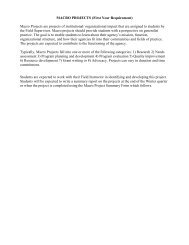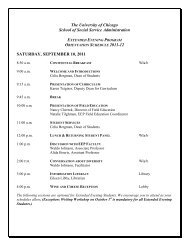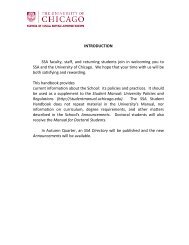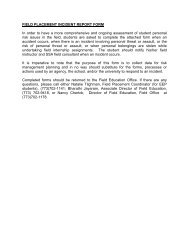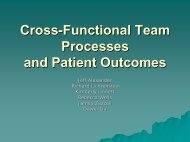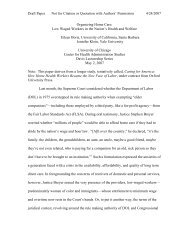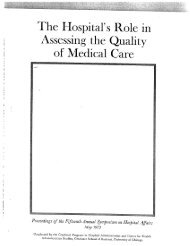DEFINING PROBLEMS. SHAPING SOLUTIONS . - School of Social Service ...
DEFINING PROBLEMS. SHAPING SOLUTIONS . - School of Social Service ...
DEFINING PROBLEMS. SHAPING SOLUTIONS . - School of Social Service ...
You also want an ePaper? Increase the reach of your titles
YUMPU automatically turns print PDFs into web optimized ePapers that Google loves.
a d v o c a t e s ’ f o r u m<br />
and work through staff resistance (Kotter and Schlessinger 1979), as<br />
well as manage transference and counter-transference as an authority<br />
figure (Daniels and Daniels 1989). This includes responding to extreme<br />
expectations during a leadership transition when the new administrator is<br />
considered either a “second rate replacement or flawless savior,” similar to<br />
clients’ expectations that a new therapist will be better or worse than the<br />
last (White 1985, 14).<br />
A clinical background also helps administrators to better understand<br />
organizational systems and behavior. Because administrators depend on<br />
informal communication to make many decisions (Mintzberg 1990),<br />
the clinician’s aptitude for observing and understanding latent meaning,<br />
content, and processes will help them to negotiate multiple systems to reach<br />
a desired, sometimes covert, end in their administrative role (Rosenberg and<br />
Clarke 1987). Furthermore, the systemic thinking necessary to understand<br />
a client’s problem within multiple contexts also informs administrators<br />
on how to negotiate complex systems to achieve a desired goal. John, a<br />
clinician with thirty years <strong>of</strong> experience and currently a department director<br />
for a local government agency, insists, “Systemic thinking is very helpful in<br />
an administrative role. Being a social worker helped … being able to look at<br />
it from a systemic view. I think that somebody who is not would have been<br />
challenged by it.”<br />
Agency assessments and environmental scans are central to<br />
understanding an organization within its context (Hasenfeld 2009).<br />
Therefore, assessment skills are one more shared skill set between clinical<br />
and administrative social work, although assessment methods differ.<br />
Environmental scans and agency assessments may be thought <strong>of</strong> as a<br />
much more complicated client assessment. Understanding the need for<br />
assessment and knowing how to assess on a multisystemic level are skills<br />
learned from clinical experience which also serve as a helpful guide for new<br />
administrators (Lowe and Austin 1997).<br />
The disadvantages <strong>of</strong> Clinical Tr aining<br />
Not all administrative duties can be addressed through clinical training,<br />
which <strong>of</strong>ten neglects important aspects <strong>of</strong> administration; some clinical<br />
skills or ways <strong>of</strong> thinking can even be antithetical or dysfunctional when<br />
put into administrative practice (Hart 1984; Patti et al. 1979). For example,<br />
certain philosophical orientations that are valuable in clinical work act<br />
as a hindrance in administration. Among these is the clinical focus on<br />
client-centered, quality services, which conflicts with the agency-centered,<br />
cost-effective focus <strong>of</strong> the administrator. “The conflict is <strong>of</strong>ten expressed<br />
by business managers who complain that ‘social workers don’t care what<br />
3




